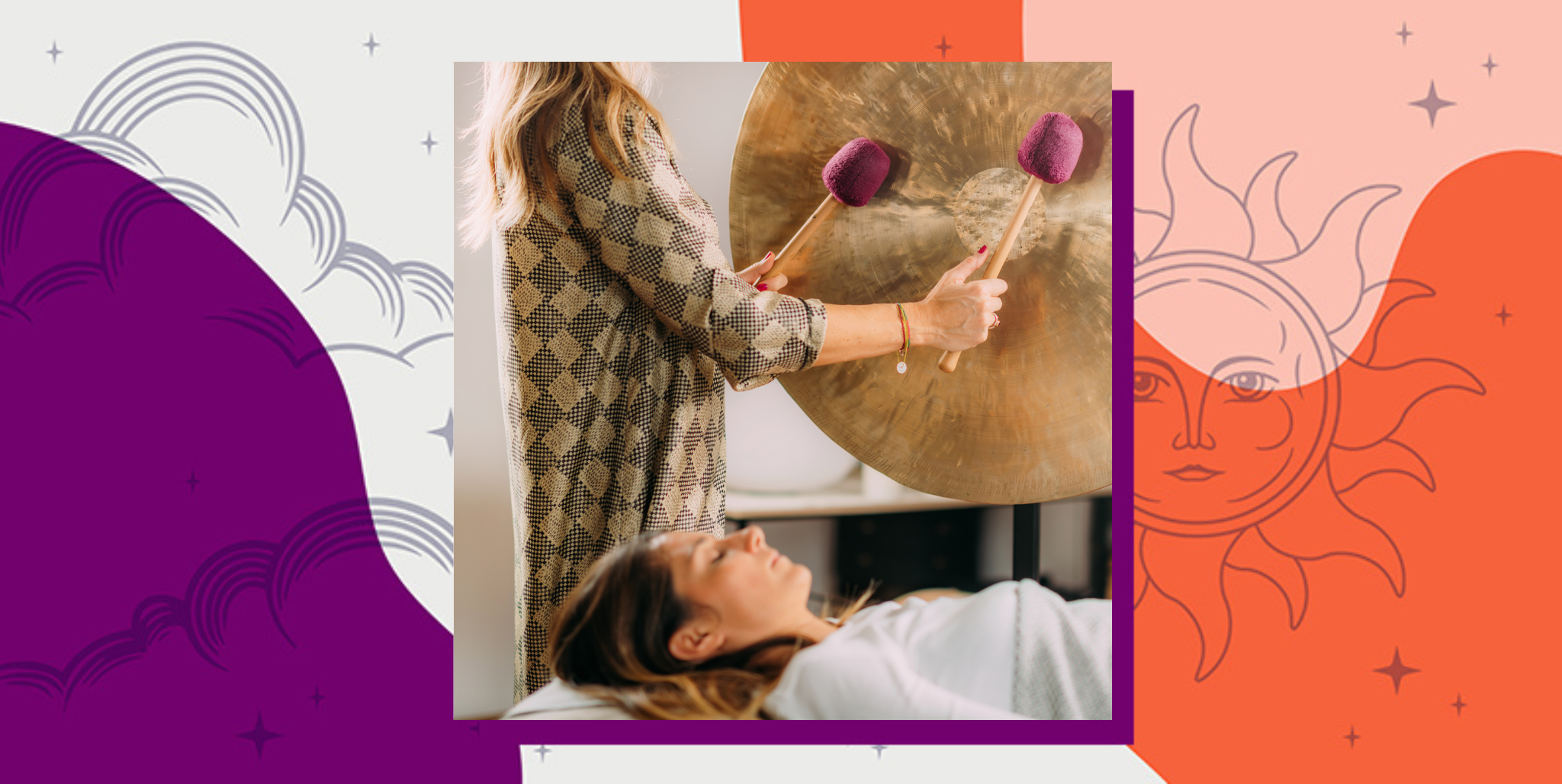The rhythmic sounds reverberate around the room, sending your mind and body into a sudden state of calm. You feel a tingle down the back of your spine as it grows louder, and your thoughts begin to soften.
The cause of your relaxation is not owing to the euphony of the latest Lewis Capaldi track or mid-facial melody, but rather a gong bath; the age-old practice that harnesses sound vibrations to alter your brainwaves and mood.
Hailed as the antidote to modern-day stress, below, we take a closer look at the sound-based phenomenon taking over, with the help of two experts.
First: what is a gong bath?
'A gong bath is a form of meditation using the deep vibrations and sounds from the instrument called a gong,' explains Harriet Emily, a London-based healing practitioner who specialises in gong baths. 'It's a circular curved metal plate shaped instrument that creates a low, reverberating, crashing sound,' she adds.
The sounds work by stimulating your vagus nerve which, as a result, help reduce your stress hormones, adds Farzana Ali, a practitioner level sound therapist, known as @thesoundtherapist. 'The vagus nerve is the longest cranial nerve travelling from the brain to many of your organs; it's located very close to the ear (there's one on each side of the body), and it makes up a huge part of your parasympathetic system (that's your rest and digest nervous system),' she explains. 'The low rumbling vibrations produced by the gong travel into your ear canals and because of the proximity to your vagus nerve, the nerve is stimulated. This signals to your brain that the body is safe, so your heart and breath rate slow.'
The reverse can happen too, she adds, whereby a sharp sound can leave you feeling agitated or nervous, causing your heart to beat faster. 'That's because your autonomic nervous system perceives that specific type of high-pitch sound as dangerous. So your heart rate increases,'Ali explains.
There is a growing body of research that points to the benefits of gong baths. A 2015 study pertaining to gong baths found that participants perceived the sound vibrations to have a relaxing effect. Meanwhile, more studies linking music therapy to health benefits are beginning to stack up.
Gong bath vs sound bath: what's the difference?
There is little difference between a 'gong bath' and 'sound bath', only that for the former the main instrument used in the session is a gong.
'This means, a gong bath can also be called a sound bath, but a sound bath may not necessarily be a gong bath. There’s also not much difference between say a gong bath or a sound healing session that uses another instrument such as crystal singing bowls for example,' says Ali.
The terminology is mainly subject to your own personal resonance and affinity to an instrument, she adds. 'That said, the gong produces a much deeper, more powerful sound so it can be especially good for shifting stuck emotions.'
What happens during a gong bath?
You'll begin with some breathwork to help you relax and settle in, says Emily. 'You would then be guided to lie down and set an intention for yourself to help you focus during the sound journey. Once this is set, I would begin playing a variety of different gongs – all different sizes and tuned to different pitches to produce complementary and variable sounds from deep waves to higher crashing moments.'
She continues: 'As the sounds come to an end, I would gently guide you to reawaken and take some time to notice how you feel after listening to the different sounds.'
Where does it originate from?
'The practice of Musical Therapy began in the 1940’s and the beginning of modern-day Sound Baths began around the 1960’s, however some of the instruments used in Sound Healing originally date back many thousands of years, for example the Gong, which first originated around 3500BC or the Himalayan Bowls, first worked with around 500BC,' says Emily.
What are the benefits of a gong bath?
It helps you unwind
'The deep sounds of the gongs naturally help you to arrive into a state of relaxation and meditation, as the sounds help to give your mind something to distract it from itself, and therefore you find yourself feeling much calmer and peaceful from the experience,' says Emily. This could have a knock-on effect on the quality of your sleep as you'll be in a more restorative (read: less stressy) state when it's time for bed.
You make time for yourself
'By making a gong bath part of your regular wellbeing practice or social calendar, you may naturally find that you feel happier, uplifted and calmer within by making dedicated time for your wellbeing where all you need to do is lie down, close your eyes and listen,' says Emily. It allows you to make carve out for yourself in an easy, manageable way allowing a window of calm and rest.
It helps reduce stress levels
We don't need to tell you the repercussions that come with a bout of stress. 'Sound healing is a practice you can use to help manage your stress levels by taking the time to relax, unwind and remove yourself from whatever current situations you may be facing in the outside world,' adds Emily. 'By participating in relaxing exercises, and reducing your stress levels, your overall health can only improve.'
It slows down your heart rate
'A gong bath takes you to a place of rest by slowing down your heart and breath rate,' says Ali. 'The sounds stimulate your vagus nerve so that helps reduce your stress hormones and allows you to feel less anxious too.'
Helps improve focus
'Finally, because it is a meditative practice, over time, gong baths can help you improve focus and clarity,' adds Ali.













